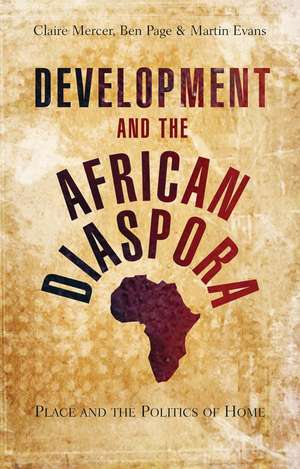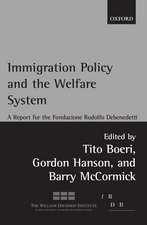Development and the African Diaspora: Place and the Politics of Home
Autor Claire Mercer, Ben Page, Martin Evansen Limba Engleză Paperback – 31 oct 2008
There has been much recent celebration of the success of African 'civil society' in forging global connections through an ever-growing diaspora. Against the background of such celebrations, this innovative book sheds light on the diasporic networks - 'home associations' - whose economic contributions are being used to develop home. Despite these networks being part of the flow of migrants' resources back to Africa that now outweighs official development assistance, the relationship between the flow of capital and social and political change are still poorly understood.
Looking in particular at Cameroon and Tanzania, the authors examine the networks of migrants that have been created by making 'home associations' international. They argue that claims in favour of enlarging 'civil society' in Africa must be placed in the broader context of the political economy of migration and wider debates concerning ethnicity and belonging. They demonstrate both that diasporic development is distinct from mainstream development, and that it is an uneven historical process in which some 'homes' are better placed to take advantage of global connections than others.
In doing so, the book engages critically with the current enthusiasm among policy-makers for treating the African diaspora as an untapped resource for combating poverty. Its focus on diasporic networks, rather than private remittances, reveals the particular successes and challenges diasporas face in acting as a group, not least in mobilising members of the diaspora to fulfill obligations to home.
Looking in particular at Cameroon and Tanzania, the authors examine the networks of migrants that have been created by making 'home associations' international. They argue that claims in favour of enlarging 'civil society' in Africa must be placed in the broader context of the political economy of migration and wider debates concerning ethnicity and belonging. They demonstrate both that diasporic development is distinct from mainstream development, and that it is an uneven historical process in which some 'homes' are better placed to take advantage of global connections than others.
In doing so, the book engages critically with the current enthusiasm among policy-makers for treating the African diaspora as an untapped resource for combating poverty. Its focus on diasporic networks, rather than private remittances, reveals the particular successes and challenges diasporas face in acting as a group, not least in mobilising members of the diaspora to fulfill obligations to home.
| Toate formatele și edițiile | Preț | Express |
|---|---|---|
| Paperback (1) | 197.77 lei 43-57 zile | |
| ZED BOOKS – 31 oct 2008 | 197.77 lei 43-57 zile | |
| Hardback (1) | 509.12 lei 43-57 zile | |
| ZED BOOKS – 31 oct 2008 | 509.12 lei 43-57 zile |
Preț: 197.77 lei
Preț vechi: 229.61 lei
-14% Nou
Puncte Express: 297
Preț estimativ în valută:
37.84€ • 39.62$ • 31.31£
37.84€ • 39.62$ • 31.31£
Carte tipărită la comandă
Livrare economică 07-21 aprilie
Preluare comenzi: 021 569.72.76
Specificații
ISBN-13: 9781842779019
ISBN-10: 184277901X
Pagini: 272
Dimensiuni: 138 x 216 x 23 mm
Greutate: 0.34 kg
Ediția:New.
Editura: ZED BOOKS
Colecția Zed Books
Locul publicării:London, United Kingdom
ISBN-10: 184277901X
Pagini: 272
Dimensiuni: 138 x 216 x 23 mm
Greutate: 0.34 kg
Ediția:New.
Editura: ZED BOOKS
Colecția Zed Books
Locul publicării:London, United Kingdom
Cuprins
List of Figures
List of Tables
Currencies
List of Acronyms
Preface
Acknowledgements
Part I: Why home associations matter
Chapter 1 - Home associations: between political belonging and moral conviviality
Chapter 2 - Contexts and comparisons
Chapter 3 - Rethinking research on African diasporas and development
Part II - The history and structure of home associations
Chapter 4 - Home associations and the nation in Cameroon
Chapter 5 - Home associations and the nation in Tanzania
Part III - The developmental and political work of African home associations
Chapter 6 - Welfare and social support in the diaspora
Chapter 7 - Modernizing burial and death celebrations
Chapter 8 - Education and inequality
Chapter 9 - Infrastructure and accountability
Part IV: Home associations, migration and development
Chapter 10 - Conclusions
List of Tables
Currencies
List of Acronyms
Preface
Acknowledgements
Part I: Why home associations matter
Chapter 1 - Home associations: between political belonging and moral conviviality
Chapter 2 - Contexts and comparisons
Chapter 3 - Rethinking research on African diasporas and development
Part II - The history and structure of home associations
Chapter 4 - Home associations and the nation in Cameroon
Chapter 5 - Home associations and the nation in Tanzania
Part III - The developmental and political work of African home associations
Chapter 6 - Welfare and social support in the diaspora
Chapter 7 - Modernizing burial and death celebrations
Chapter 8 - Education and inequality
Chapter 9 - Infrastructure and accountability
Part IV: Home associations, migration and development
Chapter 10 - Conclusions
Descriere
Descriere de la o altă ediție sau format:
There has been much celebration of the success of African 'civil society' in forging global connections through an ever-growing diaspora. Against the background of such celebrations, this book focuses on the diasporic networks - 'home associations' - whose economic contributions are being used to develop home.
There has been much celebration of the success of African 'civil society' in forging global connections through an ever-growing diaspora. Against the background of such celebrations, this book focuses on the diasporic networks - 'home associations' - whose economic contributions are being used to develop home.











